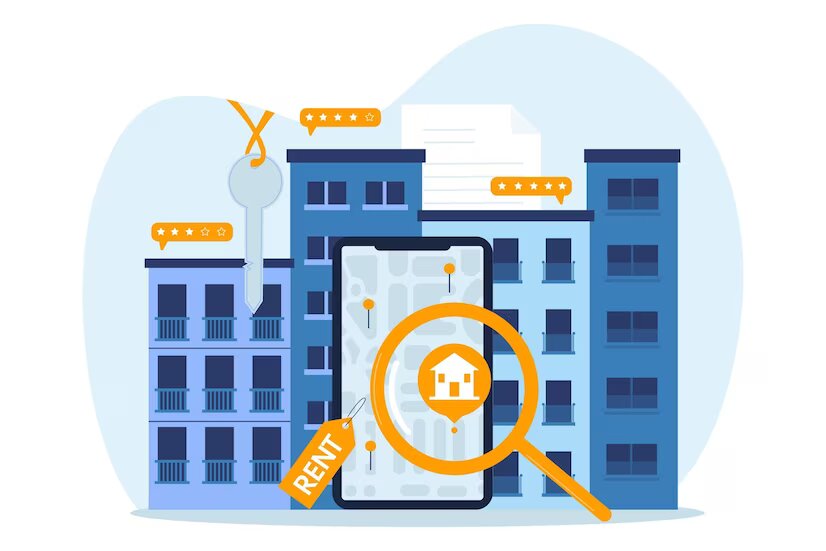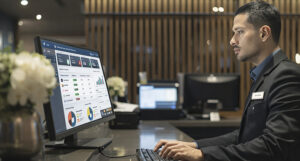Running a hotel business is no easy feat. There are countless things to keep track of, from guest bookings to housekeeping schedules to financial records. A property management system (PMS) can help streamline all these tasks and more, making it an essential tool for any hotel looking to maximize efficiency and profits.
What is a Property Management System (PMS)?
A property management system (PMS) is a software application that enables hotel operators to manage their day-to-day operations, including managing reservations, check-ins, check-outs, billing, housekeeping, and more. PMS software typically integrates with other hotel software systems, such as point-of-sale (POS) systems, customer relationship management (CRM) systems, and revenue management systems, to provide a complete solution for hotel management.
The Benefits of a Property Management System (PMS) for hotels
Improved Efficiency
One of the primary benefits of a property management system is improved efficiency. With a PMS, hotel staff can manage multiple tasks from one central system, eliminating the need for manual processes and reducing the likelihood of errors. For example, front desk staff can use a PMS to manage guest bookings, check-ins, and check-outs, while housekeeping staff can use the system to manage room cleaning schedules and track inventory levels.
Increased Revenue
A property management system can also help hotels increase revenue. PMS software often includes revenue management features that allow hotel operators to set prices dynamically based on supply and demand. Hotels can maximize revenue and profits by adjusting room rates based on factors such as occupancy levels and competitor rates.
Enhanced Guest Experience
A property management system can also improve the guest experience. With a PMS, guests can make online reservations, check in and out quickly, and access their bills and room information at any time. PMS software can also integrate with customer relationship management (CRM) systems to provide personalized guest experiences and targeted marketing campaigns.
Improved Data Management
Another benefit of a property management system is improved data management. With a PMS hotel operators can easily access and analyze data on guest bookings, room occupancy rates, revenue, and more. This data can be used to make informed business decisions and identify areas for improvement.
Choosing the Right Property Management System (PMS) for Your Hotel
There are many different property management systems available on the market, each with its unique features and capabilities. When choosing a PMS for your hotel, it’s important to consider your specific needs and requirements.
Scalability
First and foremost, consider the scalability of the PMS. As your hotel grows and expands, you’ll need a system that can handle increased demand and larger volumes of data. Look for a PMS that can scale up or down as needed and that can integrate with other hotel software systems.
Integration
Integration is another important factor to consider when choosing a property management system. Look for a PMS that can integrate with other hotel software systems, such as POS systems, CRM systems, and revenue management systems. This will enable you to manage all aspects of your hotel operations from one central system, improving efficiency and reducing the likelihood of errors.
User-Friendliness
Ease of use is also an important consideration when choosing a PMS. Look for a system that is intuitive and easy to navigate, with a user-friendly interface that hotel staff can quickly learn and master.
Security
Finally, security is a critical consideration when choosing a property management system. Look for a PMS that is secure and compliant with industry standards for data privacy and security. Make sure the system has robust data backup and recovery procedures in place to ensure your data is protected in the event of a data breach or system failure.
Implementing a Property Management System (PMS) in Your Hotel
Implementing a property management system can be a significant undertaking, but it’s an investment that can pay off in improved efficiency, increased revenue, and enhanced guest experiences. Here are some tips for successfully implementing a PMS in your hotel:
Set Goals and Objectives
Before implementing a PMS, set clear goals and objectives for what you hope to achieve with the system. This will help you select the right system and ensure that everyone on your team understands the purpose and benefits of the PMS.
Train Staff
Proper training is essential for successful PMS implementation. Make sure all staff members who will be using the system are trained thoroughly and understand how to use it effectively. Consider offering refresher training periodically to ensure that staff members are using the system to its full potential.
Test and Refine
Once the PMS is implemented, test it thoroughly and refine your processes as needed. Solicit feedback from staff members and guests to identify areas for improvement and make necessary adjustments.
Monitor Performance
Continuously monitor the performance of your PMS and use the data to make informed business decisions. Analyze data on occupancy rates, revenue, and guest satisfaction to identify areas for improvement and make data-driven decisions.
Choose the Right PMS Vendor
Selecting the right PMS vendor is crucial to the success of your implementation. Look for a vendor with a proven track record in the hospitality industry and a reputation for quality support and service. Consider factors such as the vendor’s level of experience, the breadth of their features, and the level of customization they offer. It’s also important to consider the vendor’s pricing model and the level of integration they offer with other systems and platforms. By choosing the right PMS vendor, you can ensure a smooth implementation and ongoing success with your system.
A property management system is an essential tool for any hotel looking to maximize efficiency and profits. With a PMS, hotel operators can manage all aspects of their operations, from guest bookings to billing to housekeeping schedules, from one central system. A PMS can also help hotels increase revenue, improve the guest experience, and make informed business decisions based on data analysis. When choosing a property management system, consider factors such as scalability, integration, user-friendliness, and security. And when implementing a PMS, set clear goals, train staff thoroughly, test and refine processes, and monitor performance continuously. By implementing a PMS effectively, hotels can improve efficiency, increase revenue, and provide better guest experiences.



